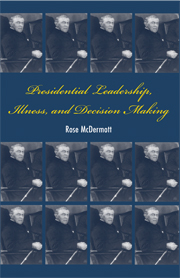Book contents
- Frontmatter
- Contents
- Acknowledgments
- 1 Introduction
- 2 Aging, Illness, and Addiction
- 3 The Exacerbation of Personality: Woodrow Wilson
- 4 Leading While Dying: Franklin Delano Roosevelt, 1943–1945
- 5 Addicted to Power: John F. Kennedy
- 6 Bordering on Sanity: Richard Nixon
- 7 The Twenty-fifth Amendment
- 8 Presidential Care
- Appendix: Foreign Leadership and Medical Intelligence: The Shah of Iran and the Carter Administration
- Notes
- Bibliography
- Index
2 - Aging, Illness, and Addiction
Published online by Cambridge University Press: 24 May 2010
- Frontmatter
- Contents
- Acknowledgments
- 1 Introduction
- 2 Aging, Illness, and Addiction
- 3 The Exacerbation of Personality: Woodrow Wilson
- 4 Leading While Dying: Franklin Delano Roosevelt, 1943–1945
- 5 Addicted to Power: John F. Kennedy
- 6 Bordering on Sanity: Richard Nixon
- 7 The Twenty-fifth Amendment
- 8 Presidential Care
- Appendix: Foreign Leadership and Medical Intelligence: The Shah of Iran and the Carter Administration
- Notes
- Bibliography
- Index
Summary
Illness raises the specter of unpredictable choice and action. Leaders who are impaired by physical or psychological illness or unduly affected by drugs and medication rarely remain as stable or predictable as those who are not. The prospect of disabled leaders arouses fear, anger, and anxiety in many observers and constituents as they contemplate the loss of stability, security, or predictability in their nation's future.
This public discomfort can produce different outcomes. On the one hand, voters often appear loath to vote for candidates who had past serious illnesses, even if they appear to be “cured” at the time of the campaign. This occurred in 1972 with the revelation of vice-presidential candidate Tom Eagleton's past bouts with depression and his treatment with electroshock therapy. McGovern was forced to pull Eagleton off the ticket in the wake of the public furor, thus leading to accusations of lack of judgment on McGovern's part for selecting Eagleton. Politically and perhaps medically, McGovern may have been justified in his choice, but the public wanted a chief executive who, they believed, could stand up to the inherent stresses of the job without undue vulnerability. Despite the fact that Eagleton had experienced his depression many years prior with no subsequent recurrences, about 30 percent of people who suffer major depression do not always respond well to medication.
- Type
- Chapter
- Information
- Presidential Leadership, Illness, and Decision Making , pp. 19 - 44Publisher: Cambridge University PressPrint publication year: 2007



